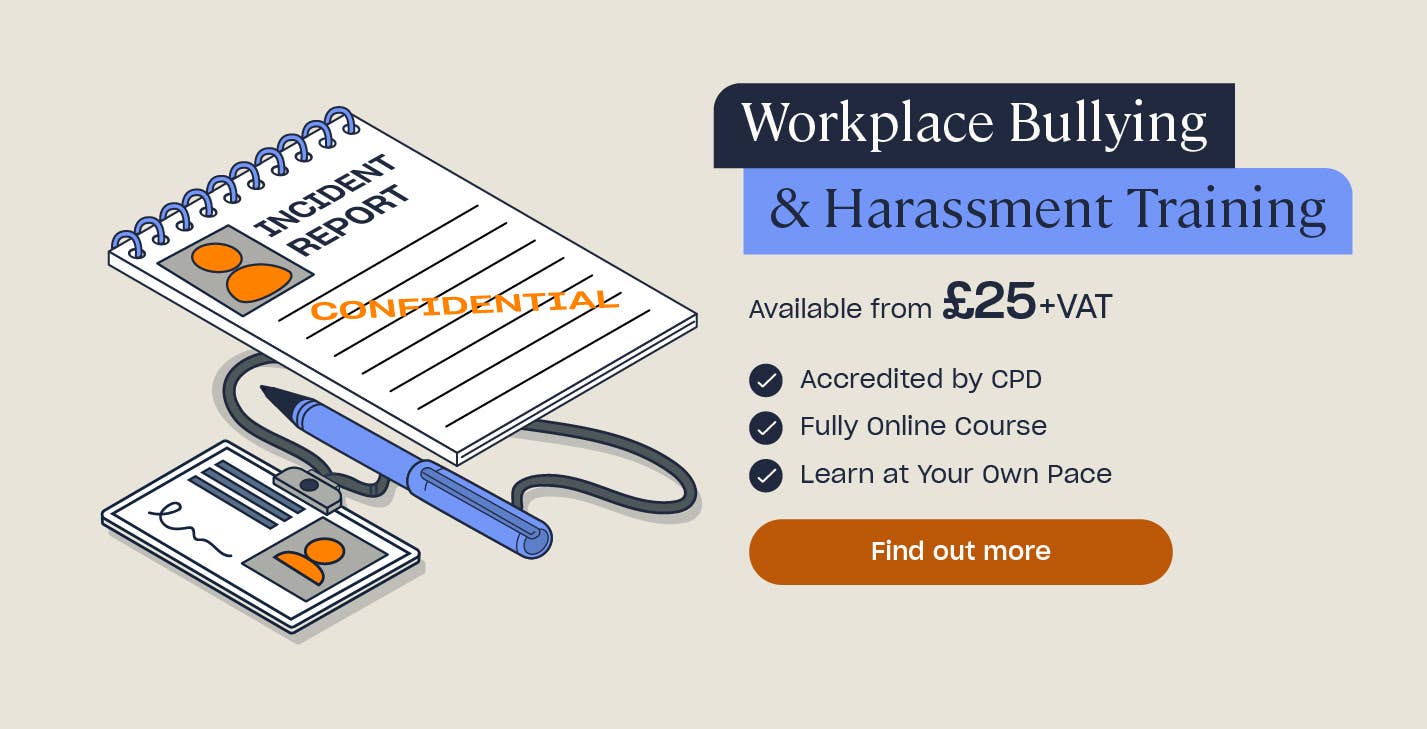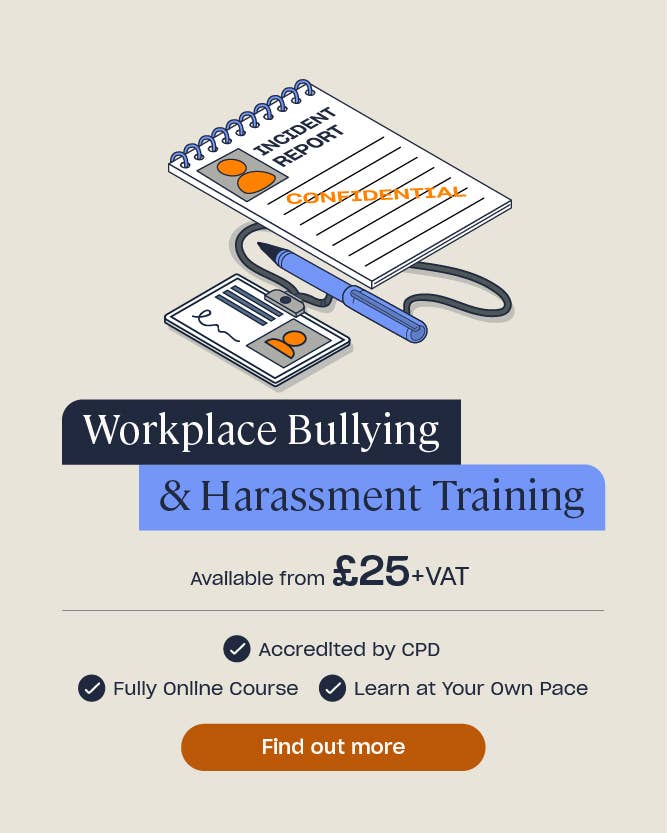Am I Being Bullied at Work? 12 Signs of Bullying in the Workplace
Sadly, and frighteningly, workplace bullying is incredibly common. The Trades Union Congress found that a staggering 29% of people have been bullied at work, with even more reporting to have witnessed bullying occur.
Bullying can take many forms. It can be covert and subtle, or it can be blatant and obvious. Bullying does not have to occur a certain number of times to be classified as such – any instance of behaviour that is intended to hurt, threaten, intimidate, force, or coerce, is bullying.
Signs of Workplace Bullying
If you have experienced any of the above behaviours in your workplace, then you may be the subject of bullying. Some common noticeable signs of workplace bullying include:
- Constant criticism.
- Removal of duties without reason.
- Overbearing supervision or monitoring.
- Threats, aggression, and shouting.
- Being put down, picked on (either in private or in front of others), and made to feel like the butt of the jokes.
- Being excluded and ignored.
- Having malicious rumours spread about you.
- Unwelcome sexual advances.
- Misusing a position of power to belittle, demean, or intimidate.
- Refusing reasonable requests.
- Unfounded threats and comments about job security.
- Blocking promotion, progress, or training opportunities.
Raise Awareness of Bullying
Our Workplace Bullying & Harassment Training explores the difference between bullying and harassment, the laws that protect workers from harassment, and the laws that make tackling bullying a statutory duty for employers. You can also find a range of Business Essentials courses here.
Behaviours of a ‘Bully Boss’
Workplace bullying might happen between anybody in the workplace. If you did feel like you were being bullied at work, it is likely that you’d report it to your manager or boss. But what happens when these people are the bullies?
It is not always obvious to recognise when a boss is the one doing the bullying. Often, people will assume that their boss is just tough, wanting to get the best results, and under a lot of pressure. However, bullying is always unacceptable and these are not excuses.

Below is a list of behaviours that may indicate your boss is demonstrating bullying characteristics:
- They threaten you. Threatening can encompass a wide range of behaviours, including threatening to fire you, making threatening gestures, or threatening to physically harm you. This also includes aspects of intimidation, such as invading your space and towering over you.
- They verbally abuse you. Verbal abuse is a highly indicative sign that your boss is a bully. This includes shouting at you, swearing at you, making snide remarks, unfair and unwarranted criticism, and making offensive and humiliating jokes at your expense. Verbal abuse can occur both in private and in front of others.
- They question your abilities. A ‘bully boss’ could frequently question your abilities, skills, ideas, and accomplishments. They could belittle your work and decrease your confidence in your adequacy to perform your job role.
- They undermine your work. As well as undermining your work by questioning your skills and abilities, they may undermine your work in many further ways. They may regularly change your assigned tasks (sometimes without telling you), withhold necessary information, give you more work than you can handle, and make overly critical and unjustified comments about your work.
- They intrude on your privacy. Signs that somebody is intruding your privacy include them listening in on your conversations, watching your behaviours, opening your mail, looking through your possessions, or even spying on you.
- They hinder your chances of success. A boss who is bullying you may deny you promotions and additional training, all to stop you from progressing. They may also closely monitor and try to manage all your projects.
- They isolate you. Isolating people socially is a way for a ‘bully boss’ to gain control and make you doubt yourself. They may exclude you from social events, company outings, and even from mailing lists.
- They spread rumours about you. If a bully is wanting to make you look bad, they may gossip about things such as your appearance and your abilities. They may also spread rumours about your personal life.

How to Report Bullying at Work
If you are experiencing any of these behaviours, it’s important that you speak up. This is not only important for your own wellbeing, but you may also be unknowingly helping other colleagues who are experiencing the same thing.
The first action you can take, if you feel comfortable to do so, is to speak directly to the person who is behaving in this way. It may be that they do not realise what they are doing, or how their behaviours are affecting you. Be clear with how you feel and try to stay calm.
If you do not want to do this, or if you have already done so and the behaviours have continued, you could report it to any of the following:
- Your line manager. This person is responsible for supporting you and your wellbeing at work. If you do not feel comfortable speaking to them, for example if they are the one demonstrating the behaviour, you could speak to another manager.
- Your HR department. They have a responsibility to investigate and take matters such as these further. This may involve them speaking to the perpetrator and offering you any support that you need.
- Your trade union representative (if you have one). They can help you to agree on a way forward and speak up for you if you are uncomfortable doing so yourself.
If none of the above are suitable for your circumstances, you could make a formal complaint using your organisation’s grievance procedure. In addition, if you need any further help or advice, you could contact Acas – an independent public body that provides advice on dealing with workplace conflict.
There are many reasons for why your boss may be acting the way they are. For example, if you are a high performer, your boss may feel threatened that you could supersede and replace them. However, this is no excuse, and bullying is never acceptable.
Overall, if you find that you are asking yourself ‘Am I being bullied at work?’, the likelihood is that you are. If someone is demonstrating the above signs of ‘bully boss’ behaviour, and treating you in a way that makes you feel uncomfortable and intimidated, it is important that you report it.
What To Read Next:
- Key Phrases For Performance Reviews
- Business Essentials Courses
- What To Do If You Suspect Mental Health Discrimination At Work
- Preventing Sexual Harassment in the Workplace: Employer Responsibilities
- Sexual Harassment in the Workplace: What Is It and How Do I Report It?
- Workplace Bullying and Harassment Quiz
- Abuse of Authority in the Workplace
- Bullying and Harassment Online Training







